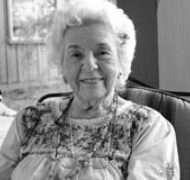Book Club: Mindful Aging
Blog / Produced by The High Calling
We are sitting on the patio in a circle, sharing introductions and our writing, scribbling down crumbs of wisdom dropped into this space by our workshop leader. We are here at Laity Lodge to learn about writing creative nonfiction but...her shoes keep distracting me. She has parked her walker beside her chair and propped her feet up on the stool in front of her. Bright red toenails peek out of little pink glittered open-toed slippers with satiny bows on top.
Her name is Helen and she beams at us when it is her turn to speak.
“It’s kind of hard at age ninety,” she begins. “It’s kind of hard at ninety to ask God which way to go after losing your mate of sixty-five years.”
She shuffles the papers she is holding and begins to read the essay she has prepared for us.
“I could easily entitle these words ‘God’s Surprises’…”
Her story is about family, about the home she and her husband made together, about meals prepared and served in her kitchen. It’s from a book she wrote for her family and she shows us the bound version—a collection of family stories and photographs: bits of love gathered and pressed between pages.
We are surrounded by trees and stone and the wind blows a leaf skitting across the hard surface of the patio. And all I can think is how I hope I’m still letting God surprise me when I am ninety years old.
“Getting old is not for sissies,” I often tell the elderly patients I work with. They always laugh and nod their heads but in our weekly reading from Mindfulness this week, Dr. Ellen J. Langer tells us that maybe they agree too readily. This week we are discussing chapter six, Mindful Aging.
Age is such a potent marker that whatever happens to our minds and bodies in later life, we assume it to be the result of advancing years. If older people do anything the least bit unusual, we label it eccentricity or senility, even if they have been doing the same thing all their lives. Within such constricting mindsets…growth, flexibility, and new enterprise become impossible. Not only the quality but the length of our lives may be affected.
We have very strong ideas about aging, Langer says, and many of these are premature cognitive commitments. Remember the premature cognitive commitment from chapter three? This is when we form a mindset when we first encounter something and then cling to it when we reencounter that thing in the future. We don’t think critically about it, and we mindlessly accept our first impression.
Some premature cognitive commitments we make about aging are that it’s natural for older people to be inactive, independence for the elderly is dangerous (they might hurt themselves!), mental dullness and memory loss are inevitable with aging, and elderly people cease to grow mentally and emotionally.
These mindsets often lead to a self-fulfilling prophecy as we age. Watching someone else do things that we used to do ourselves leads us to feel that we are now incapable of doing them, Langer says. Mindsets about old age confirm a sense of incompetence.
On the contrary, Langer’s research shows that when elderly people in a nursing home were encouraged to make more decisions and given more responsibility, in their day-to-day life they took more initiative, were more active and vigorous, and more sociable than residents in a control group. These effects were still present in a follow-up conducted eighteen months after the study. In that follow-up, the researchers also evaluated the health of the two groups. They found that the health of the group who were given more responsibility had improved but the health of the other group had declined.
…The most striking discovery, however, was that the changed attitudes we had initiated in these nursing home residents resulted in a lower mortality rate. Only seven of the fort-seven subjects in the experimental group had died during the eighteen-month period, whereas thirteen of the forty-four subjects in the comparison group had died (15 percent versus 30 percent).
Langer defines the treatment in this experiment—encouraging decisions and increasing responsibility—as increasing mindfulness. In a second study designed to increase mindfulness, Langer and her associates found that the more decisions and control required of the subjects, the more likely they were to have become (1) less depressed; (2) more independent and confident; and (3) more alert and differentiated in their choices.
Yet another study indicated that elderly residents of a nursing home who are given mindfulness training activities outperform controls on ratings of alertness, short term memory, and overall health.
I don’t know how well Langer’s research studies were designed, but she does attain similar results repeatedly. It seems to make sense that individuals who are encouraged to continue to invest themselves in life as they age will have a richer experience than those who let others coordinate the details of life.
Helen is writing a new book. She calls it The Feast. And I am considering starting a collection of sparkly shoes.
Next week we’ll be discussing chapter seven: Creative Uncertainty of Ellen J. Langer's book Mindfulness. If you’d like to join the discussion, leave a comment or link up below with a post at your blog.
Photo by Laura Boggess. Used with permission. Post by Laura Boggess too.





